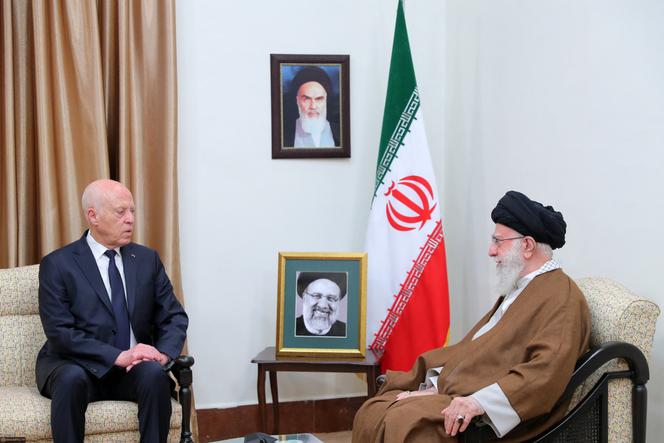


Kais Saied's visit to Tehran on Wednesday, May 22 to attend the funeral of Iranian president Ebrahim Raisi, who had died three days earlier in a helicopter crash, was hardly an obvious move in the context of Tunisian diplomatic tradition. Saied, the president of Tunisia, was received by the Supreme Leader of the Islamic Republic, Ayatollah Ali Khamenei, the same man who had congratulated him on his election in October 2019, describing as both virtuous and academic.
Saied's presence in Tehran, alongside two other heads of state (Tajikistan, Qatar), prime ministers (Pakistan, Kyrgyzstan, Iraq, Syria, Azerbaijan, Venezuela, Belarus, and others), foreign ministers (Oman, Bahrain, United Arab Emirates, Saudi Arabia) and other lower-ranking envoys, marks a notable change of direction in Tunisian diplomacy. The last time a Tunisian head of state visited Iran was in 1965, when Habib Bourguiba met the Shah of Iran during an eight-week diplomatic tour of some ten countries.
At a time when Saied's relations with the West are tense and his discreet rapprochement with Russia is taking its first steps, this visit to Tehran is bound to raise questions about Tunisia's strategic positioning. The first personal contact with an Iranian leader took place in early March in Algiers, during the Gas Exporting Countries Forum summit. As a sign of Algeria's close interest in the fate of Tunisia, its small eastern neighbor, over which it exercises increasing tutelage, Saied was the "guest of honor." This gave him the opportunity to meet the leaders of the gas powers, and, in particular, the Iranian president himself, Ebrahim Raisi, less than three months before his death. In Algiers, Saied praised "the will of the peoples who liberated themselves from colonialism" working to "impose full sovereignty over their natural resources."
For Saied, who was brought up in the school of Arab nationalism and is regularly contemptuous of "foreign diktats" (by which he means Western diktats), this trip to Tehran is a continuation of a diplomatic trajectory in which "anti-imperialist" ideology coexists with the pressing quest for vital financing for a Tunisian economy on the brink of bankruptcy. "Saied is constantly sending the message to Europeans and Americans that Tunisia has the right to forge or strengthen ties with other powers, including anti-Western ones," observes Hamza Meddeb, a research fellow at the Carnegie Middle East Center.
Since refusing to sign an agreement with the International Monetary Fund (IMF) for a $1.9 billion (€1.8 billion) loan due to the conditions attached to it, Saied has seen his options become increasingly limited. When Saudi Arabia was called upon for financial support, it made the agreement with the IMF a precondition. Qatar is demanding a compromise with the Islamist democratic Ennahda party, a number of whose leaders Saied has had imprisoned, including one of its founders, Rached Ghannouchi. As for aid from the United Arab Emirates, this would be opposed by Algeria. The closeness between Abu Dhabi and Morocco, against the backdrop of the two countries' normalization with Israel in 2020, has triggered an open crisis between the Algerians and the Emiratis.
In this context, a rapprochement with Iran would be all the easier since certain circles surrounding Saied have long-standing links with the Islamic Republic. Indeed, his own brother, Naoufel Saied, who acts as an adviser behind the scenes, has his roots in the "Islamic Left," a movement which, in the late 1970s, identified itself with the writings of Ali Shariati (1933-1977), considered one of the precursors of the Iranian revolution of 1979. Naoufel Saied has often made pro-Tehran statements. At the height of the war in Syria, for example, he drew attention to himself at a meeting by defending "the idea that the 'terrorism' of the rebellion was a plot by the US and Saudi Arabia against Syria, Russia and the Iranian renaissance," as a first-hand witness to these exchanges recalled. Kais Saied's turn towards Iran, if confirmed, would not come out of nowhere.
Translation of an original article published in French on lemonde.fr; the publisher may only be liable for the French version.
